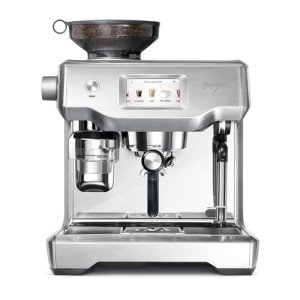Indisputable Proof That You Need High-Quality Espresso Machines
The World of High-Quality Espresso Machines: A Comprehensive Guide
Espresso has actually become a beloved beverage among coffee enthusiasts worldwide, understood for its rich flavor, intense fragrance, and flexibility. The heart of an excellent espresso lies in the machine utilized to brew it. High-quality espresso machines are developed to deliver the ideal shot, making them a vital investment for coffee fans. This short article explores different types of high-quality espresso machines, their features, upkeep suggestions, and responses to frequently asked questions.
Types of High-Quality Espresso Machines
High-quality espresso machines fall into numerous categories, accommodating various preferences, skill levels, and budgets. The primary types include:
Type of Machine
Description
Suitable User
Manual Espresso Machines
Requires user ability to control extraction and pressure. Offers Buy Coffee Maker over the brewing process.
Experienced baristas and enthusiasts
Semi-Automatic Machines
Combines manual operation with automation. Users manage the grind and tamping, while the machine handles water dispersion.
Intermediate users
Automatic Espresso Machines
Automate the brewing process, permitting programmable brewing times and temperatures.
Casual coffee drinkers
Super-Automatic Machines
Have built-in mills and are totally automated, handling everything from grinding to developing and steaming.
Users looking for convenience
Commercial Espresso Machines
Developed for high volume use in coffee shops and dining establishments, offering sturdiness and speed.
Entrepreneur
In-depth Overview of Each Type
Manual Espresso Machines
- Pros: Complete control over the brewing procedure; can produce remarkable quality espresso.
- Cons: Requires considerable skill; lengthy.
Semi-Automatic Machines
- Pros: Balanced control, blending manual and automatic procedures; superior quality espresso is still possible.
- Cons: Requires some knowledge and experience to master.
Automatic Espresso Machines
- Pros: User-friendly; minimizes the finding out curve while still producing high-quality espresso.
- Cons: Still requires some understanding of coffee-making fundamentals.
Super-Automatic Machines
- Pros: Maximal convenience; little skill required; ideal for individuals or households who desire coffee without fuss.
- Cons: Higher cost point; may do not have the fine-tuning abilities of manual machines.
Commercial Espresso Machines
- Pros: Built for durability and efficiency; frequently includes functions for high-volume turns.
- Cons: Expensive; may be overkill for home use.
Key Features to Consider
When trying to find a high-quality espresso machine, numerous key functions must be considered:
- Pressure and Pump Type: Look for machines with at least 9 bars of pressure, which is essential for drawing out the very best taste from coffee beans.
- Boiler Type: Single, double, and heat exchanger boilers each affect how the machine performs and the speed of brewing.
- Build Quality: High-quality materials such as stainless steel are preferable for durability and aesthetics.
- Alleviate of Use and Cleaning: Some machines require comprehensive cleansing, while others are created for easy upkeep.
- Temperature Control: Consistent temperature level is important; consider machines with PID controllers for precise control.
Advantages of High-Quality Espresso Machines
Investing in a high-quality espresso machine uses a wide range of benefits:
- Superior Quality: High-end machines enable greater control, resulting in tastier espresso.
- Sturdiness: Built to last, quality machines need less repair work and replacements.
- Personalization: Users can enjoy a tailored experience by adjusting grind size, shot timing, and other settings.
- Increased Convenience: Automatic and super-automatic alternatives permit connoisseurs to enjoy espresso with minimal effort.
Maintenance and Care for High-Quality Espresso Machines
To keep an espresso machine operating efficiently, regular upkeep is crucial. Here are suggestions for preserving a high-quality espresso machine:
Descale Regularly:
- Use a descaling option every couple of months to prevent accumulation of minerals from water, which can affect flavor and efficiency.
Clean the Brew Group:
- For machines with a detachable brew group, tidy it routinely to guarantee a tidy extraction.
Change Water Filters:
- Use a water filter and alter it as needed to lessen pollutants in your developing water.
Daily Cleanings:
- Rinse the portafilter and group head after each use to prevent oil accumulation.
Watch on the Parts:
- Monitor seals, gaskets, and other parts for wear and tear and change them as needed.
Regularly Asked Questions (FAQs)
1. What is the best espresso machine for novices?
For beginners, a semi-automatic machine frequently offers a good balance of use and control, allowing users to discover the abilities required for making great espresso.
2. Are super-automatic machines worth the financial investment?
Yes, for those who prioritize convenience and ease over control, super-automatic machines can be a worthy financial investment, particularly for households or hectic experts.
3. Just how much should I expect to spend on a high-quality espresso machine?
High-quality espresso machines vary considerably in price, with manual machines starting at a few hundred dollars, while super-automatic or commercial machines can exceed a number of thousand.
4. Can I make other coffee drinks with an espresso machine?
Yes, lots of espresso machines have steam wands or attachments that enable users to develop lattes, coffees, and more.
5. For how long do espresso machines generally last?
With appropriate maintenance, high-quality espresso machines can last over a decade, making them a long-lasting investment in your coffee enjoyment.
High-quality espresso machines yield a transformative coffee experience, whether taken pleasure in in the house or in a commercial setting. By understanding the types available, their functions, and the maintenance needed to keep them running effectively, consumers can make educated choices that raise their coffee-drinking experience.
